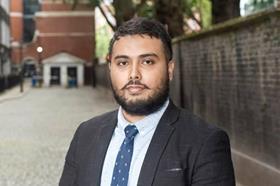In the bustling world of professional careers, especially in law, the intersection of faith and work often presents a labyrinth of challenges, especially for Muslim professionals. From balancing religious obligations to navigating social events entwined with alcohol, the journey can feel like a solitary trek through uncharted territory.

Enter Waqas Hussain, a trainee solicitor at Bird and Bird, whose brainchild, the Muslim Employment Charter (MEC), is set to reshape this landscape. The MEC stands as a beacon of hope, fostering an environment where faith and work seamlessly intertwine.
At its core, the MEC champions three fundamental pillars: the provision of essential workplace facilities such as prayer rooms and ablution spaces, the reimagining of social and networking policies to accommodate diverse needs, and a commitment to education and training to bridge any knowledge gaps.
For Muslim professionals, the MEC isn't just a document; it's a lifeline, offering a roadmap to navigate the complex terrain of faith and career. 'Our aim is to relieve Muslim employees of this burden and assist employers in gaining a better understanding of the workplace needs of their Muslim staff,' affirms Waqas. 'This will greatly benefit both current and future employees.'
Indeed, the statistics paint a poignant picture. A staggering 90% of Muslim professionals struggle to balance their religious duties with their work commitments, according to a recent survey conducted by MEC. The findings reveal a stark reality: a lack of prayer rooms, ablution facilities, and discomfort in requesting faith-based accommodations plague the professional sphere.
Yet, amidst these challenges lies a glimmer of hope. The MEC doesn't just advocate for change; it catalyzes it. By partnering with employers, the MEC facilitates a paradigm shift towards inclusivity and understanding. 'A notable advantage for employers with MEC is its operational and financial efficiency,' explains Waqas. 'It's advantageous for employers to adopt MEC, as it can lead to numerous benefits, including an enhanced reputation, stronger client relationships, legal compliance, and an empowered workforce.'
The roster of companies embracing the MEC continues to grow, with names like Barcan + Kirby, Black Antelope Law, Platypus Digital, and Bird and Bird leading the charge. These trailblazers recognise the imperative of fostering a truly inclusive environment for all employees, irrespective of their faith.
However, for Waqas and his team, this journey transcends mere partnerships; it's a quest for genuine impact. 'It's not about looking cool; it's about creating genuine, positive impact,' he emphasises. 'Our hope is that the Charter's principles resonate across various sectors, transcending mere token gestures, and lead to substantial, meaningful transformations.'
In the ever-evolving tapestry of modern workplaces, the Muslim Employment Charter stands as a testament to the power of unity in diversity. It's a blueprint for a future where faith and work not only coexist but thrive in harmonious synergy. As Waqas envisions, it's a landscape where every professional feels supported, empowered, and free to soar beyond the confines of tradition and expectation.
Shaheen Mamun is a Law Society social mobility ambassador, a member of the equality, diversity and inclusion committee and director of Black Antelope Law






























